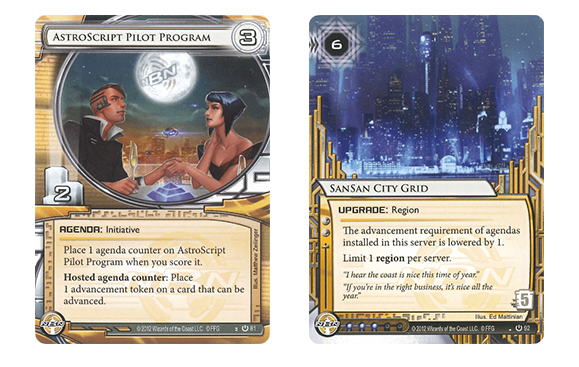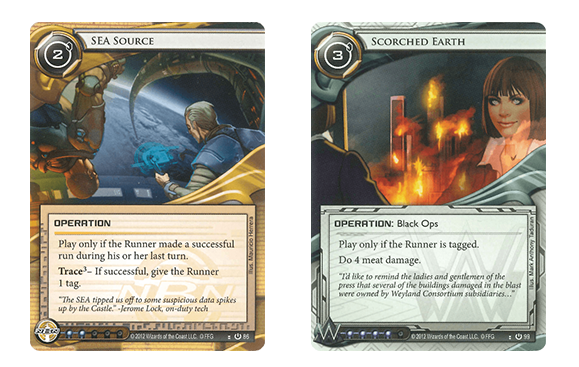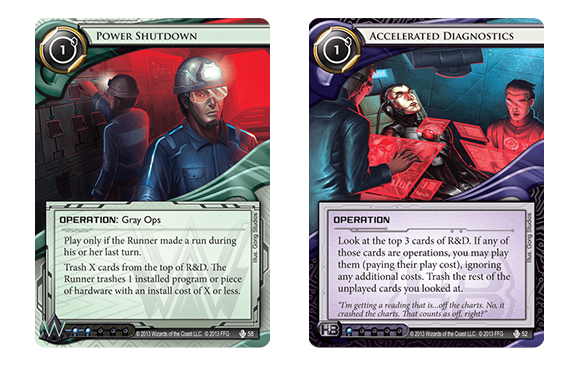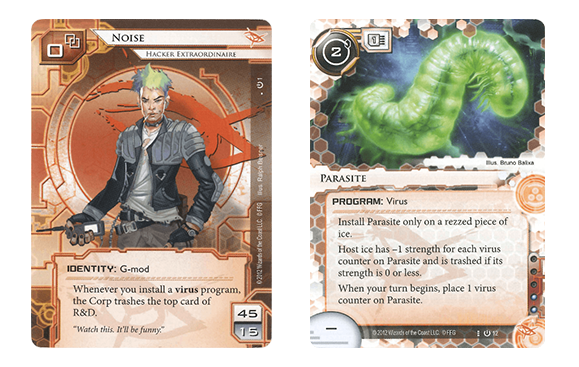I’ve been playing Netrunner for more than 4 Months now. I have caught up with all of the released expansions so far. I went to some major tournaments. I started recording my games. I met some really great people. The game has been good to me.
My initial impression of the game has evolved a lot during this time and I started to notice some interesting patterns. I’ve been paying attention to the meta-game and dominant strategies. It seems like a lot of them seem to focus on disrupting or avoiding what the implied structure of the game is. And some of that is even intended. Let me explain.
Netrunner is a game were Runners hack into a Corporation’s servers to steal the Agendas within. Corporations install Agendas in servers to advance and score them. They try to keep the Runners out by using ICE. Runners break the ICE by using Icebreaker software. This struggle is to me the implied structure of Netrunner. This structure is something a lot of strategies seem to want to get around.
Fast Advance

“Win the game without the trouble of having to deal with your opponent.”
One of the most dominant strategies by Corporations is the so-called Fast Advance. It’s an umbrella term for various combos that allow Corporations to score agendas without having to install them into servers. Most Corps nowadays use the identity NBN with Astroscropt Progam and SanSan City Grid. But you can also go with HB and Biotic Labor or Jinteki and Trick of Light. The most agressive Fast Advance decks use a combination of them.
By not having to install cards into servers, this strategy effectively eliminates a huge portion of the game. Runners may put a lot of cards in their deck to get into Servers. But if there are no servers for them to run on, a huge portion of their deck becomes useless.
Now, it’s not necessarily that bad. Even without external servers, there are still other places for the Runner to run on. They can hack into the Corp’s hand, deck or discard pile to search for agendas there. And in fact, this is an effective strategy against Fast Advance. However, going fishing for agendas in the Corp’s hands often comes down to pure chance. Fast Advance tends to eliminate a lot of strategic nuance in favor of lucky draws.
Scorched Earth

“Win the game if you have more money than your opponent.”
One very old strategy is for the Corporation to kill the Runner with Meat Damage using Scorched Earth. It’s a cad that has been out since the Core Set. It proved to be so effective, it has become a mainstay of the game. In order to kill the Runner, the Corp needs to give them a Tag. Players have been very creative in finding out how to do this. The most successful strategies are using SEA Source or Mid-Season Replacements – both of them require the Corp to have more money than the Runner.
It is no wonder the first expansion ever printed included Plascrete Carapace, an armor for the Runner to defend against Scorched Earth. Every Runner deck has to include at least 2 of them ever since. But since they can’t be tutored (yet), this defense is still quite unreliable.
For a Runner, this can feel very frustrating. You might be on your way to unravel the Corp’s security system. But then suddenly they show you 3 cards and you lose the game. No question about it. No warnings. Nothing you can do about it. Just a binary “you lose the game”. Some decks may even set up weak security on purpose to lure Runners in. So Runners will begrudgingly add their 2 Plascretes in every deck they ever build just because Scorched Earth is a thing that can happen. And then comes the sting when you draw one of them and you know your opponent is actually playing Fast Advance. Bergh.
The flip-side is that if a Runner knows a deck is heavily focused on this play, they can play around it by not running and collecting money instead. This turns Netrunner the most painfully boring waiting game.
The Combo

“Play three cards from your entire deck for free to win the game. As a bonus you get to have a 5-minute monologue explaining how exactly you won and how awesome you are.”
In my opinion, the worst thing that happened to Netrunner recently was the Power Shutdown + Accelerated Diagnostics combo. Power Shutdown makes the Corp discard cards in order to trash a Runner’s tools. But some players find out you can use this card to trash YOUR ENTIRE DECK into your discard pile. Usually this would mean you would lose next turn – having no cards to draw is a loss condition for the Corporation. But then they use Jackson Howard to pick 3 cards from archives and put them into the empty deck. Finally, they play Accelerated Diagnostics to play the 3 selected cards for free, winning the game.
How exactly they win the game is depends on the actual deck. Players have been very creative in figuring out how to win the game with 3 cards. The classic is SEA Source, 2x Scorched Earth. But some more elaborate combos manage to get more clicks, repeat the combo to do some more fancy stuff. Some decks actually manage to score 7 agenda points in one turn out of hand.
The frustrating thing is that because the combo lets you access any card in your entire deck, it doesn’t take too many cards to initiate it. A lot of the combos are also pretty cheap to pull off. So the game devolves into the Corp doing nothing except drawing cards and collecting money until they initiate the combo, play solitaire for a minute or two and finally declare they won the game.
Luckily, the combo never got too popular and you don’t see it that often nowadays. If you do, it’s makes you feel like you just wasted a lot of time.
Anarchs

Anarchs – Disruption by Design
Interestingly, an entire Runner faction also focuses on disrupting the core structure of the game. Instead of breaking ICE with Icebreakers, Anarchs use cards like Parasite and Datasucker to destroy ICE completely. They also have a lot of cards that can mill the Corporation to make them lose by running out of cards. So far, the latter hasn’t developed into a reliable deck type yet, but we are getting there. While certainly not as disruptive as some of the above examples, it suggests that this play style may be partially intended by the game’s designers.
Disruption by Design
I am convinced that combos like Power Shutdown + Accelerated Diagnostics have not been intended by the game’s designers. I also suspect that certain Fast Advance or Scorched Earth strategies have been pushed further than the original game design anticipated. Many of the above examples reduce the strategic complexity of Netrunner to a binary “Are you doing that thing or are you not doing that thing?” – the classic example of a Degenerative Strategy. On the other hand, some of those ideas are actually rooted in the game’s design. Scorched Earth has been purposefully designed to win games in a surprising fashion. Fast Advance is a core concept or else there wouldn’t be that many cards, that enable it. The entire faction of Anarchs is based on the idea of disruption.
It occurred to me that the premise of disruption is actually what motivates a lot of players in games. Players rarely play RPGs actually to role-play. They want to level up their characters to ridiculous levels and equip them with the most excessive gear to completely destroy whatever the game intended as a challenge. A posteriori, this is then labeled as “freedom of choice” or “creative expression”. Players often don’t want to just overcome challenges. They want to overcome the game as a whole.
There are two ways to spin it. On the one hand this can be seen as a creative force. Players aren’t sheep. They aren’t content with being slaves to the systems of games. They analyze the systems and exploit loopholes to their advantage. It can be seen as an act of creative subversion, of rebellion even.
On the other hand, especially in context of multi-player games, this can be also seen as a very juvenile attitude. Nitpicking the exact wording of every card to squeeze out that crucial advantage. Second-guessing and smart-assing your way to not only win but also to satisfy a desperate, egoistic desire to feel superior. It’s the attitude of “I didn’t say >Simon Says<". It's when you say to an 8-year-old "I don't want to hear a single word from you!" and they say "baaaah!" because that's not a word.
Luckily, over time the community itself develops a sense for boundaries that shouldn’t be crossed. The lack of staying power for the Power Shutdown + Accelerated Diagnostics combo shows that even the most win-oriented players aren’t happy when they win by playing essentially a game solitaire. Deck types like The Read Coats show that you can be incredibly annoying without disrupting the implicit idea of what the game is about. And yes, most of those strategies have counters – either in form of strategies or new cards released in expansions. But the dynamics of the Netrunner meta made me reconsider my understanding of Degenerative Strategies as a game designer. I’ve been used to think that they are bad and something to avoid. I’ve come to realize that they may actually be part of the reason why we play games at all – for better or worse.






I haven’t played much competitive Netrunner but have come up against the annoying archetypes, just not the killer combos. For myself, the premise of Netrunner – a game of interacting with the person across the table – makes me want to steer clear of the archetypes which degenerate into solitaire play, and while those archetypes are definitely present, I don’t think the majority of players play solely to break the game and win at all costs. The game gives you so much to play with that I’m more engaged by the playing, as opposed to the winning, and (from my experience with other players and the talk in the online community) I’m in the not-so-silent majority. I’m a little unclear as to what you’re ultimate conclusion was, but if its “The Way to Enjoy Playing is Not To Play to Win At All Costs”, I definitely agree.
However, I do have to throughly disagree with this:
“Players rarely play RPGs actually to role-play. They want to level up their characters to ridiculous levels and equip them with the most excessive gear to completely destroy whatever the game intended as a challenge. A posteriori, this is then labeled as “freedom of choice” or “creative expression”. Players often don’t want to just overcome challenges. They want to overcome the game as a whole.”
Maybe I’m just lucky, but I’ve never had a role-playing group that had one of these players. I know I do have a min-max tendency but I like to play within the system, to develop characters that are both thematically and mechanically viable, rather than making a system-breaking character just encourages the DM to find a creative way to kill me. I’m currently playing a game where one of the players has a fairly useless character, but he’s made the active choice to keep playing him cause he likes genuinely playing that character and that’s more rewarding than having a +5 attack bonus.
[...] Majewski recently published a post called Netrunner: The Way to Win is Not to Play in which he discusses the way in which certain powerful strategies in Netrunner function by [...]
Thank you for the article! I feel like the recently spoiled Hades, Eden, and Utopia shards make it pretty clear that the ANR design team knew about the combo in their testing, espeically when you factor in Lukas’ assertion that “everything needs a counter”.
(The Hades shard especially means that if the corp dumps their entire deck into archives, the runner can choose to access all cards in archives instantly, which will probably win them the game before the corp can fire off their accelerated diagnostics combo).
This Power Shutdown + Accelerated Diagnostics combo is the first thing that’s got me interested in Netrunner. I’m the kind of player who likes playing an orthogonal game, where the opponent has to concoct a different strategy than the same one they play every time. It tends to make the games very short, which I also like. There’s room for “degenerative” things like these, as long as they’re sufficiently worse than the mainstream strategies that they don’t dominate the metagame. Any successful competitive game has its “parlor trick” strategies, from knife-running in Call of Duty to combo decks in Netrunner to the suicide rush in Starcraft, and they’re a healthy part of the competitive ecosystem. A deck with Plascrete Carapace is more random, even if it’s stronger overall.
These decks sound very similar to some of Magic: The Gathering’s early growing pains. You have the control deck which bypasses all your offensive cards by playing nothing to defend against, the combo deck which relies on a single fundamentally broken card (Power Shutdown) but would be fair if that piece was less powerful, and the burn deck which uses an existing game mechanic, but doesn’t give you advance warning that it’s about to win, so it feels unfair even when they did just as much work as you did.